Bullying Prevention for Multilingual and Multicultural Kids
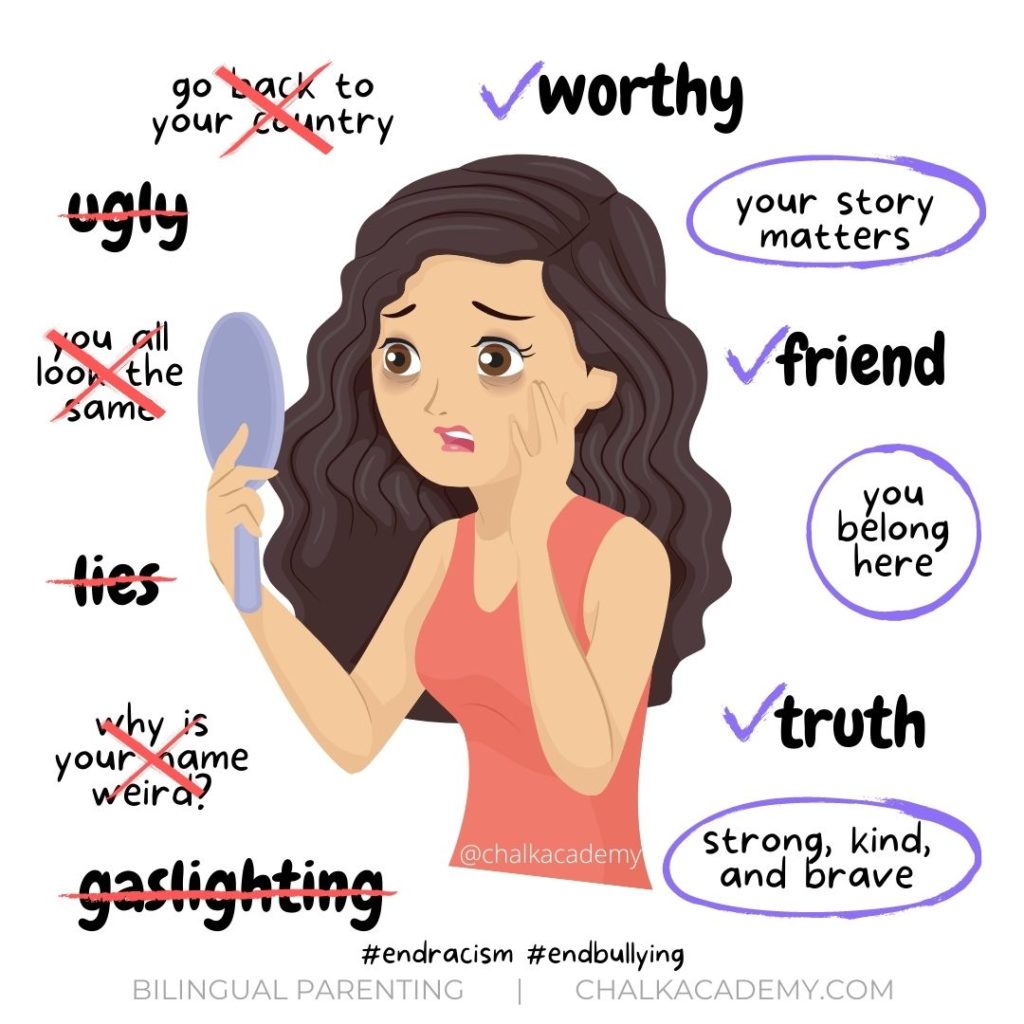
Many of you have told me that your first memory of racism occurred as early as preschool, and you’re still experiencing microaggressions today. Understandably, you are concerned about how to prevent your multicultural and multilingual children from being bullied.
As an Asian American mother, I empathize with your worries. I will start by sharing my personal experiences to encourage you to discuss yours. From the perspective of a pediatrician who is concerned about bullying as a public health problem, I will also highlight the mental health consequences of racism and conclude with anti-bullying resources.
I hope that discussions about racism and bullying can occur proactively and frequently with your family and school.
Understand this: How to Talk to Kids About Racism with Inclusive, Bilingual Resources

Chalk Academy is reader-supported. Some of the links are affiliate links. When you buy something through an affiliate link, we may earn a very small commission at no cost to you. Details here.
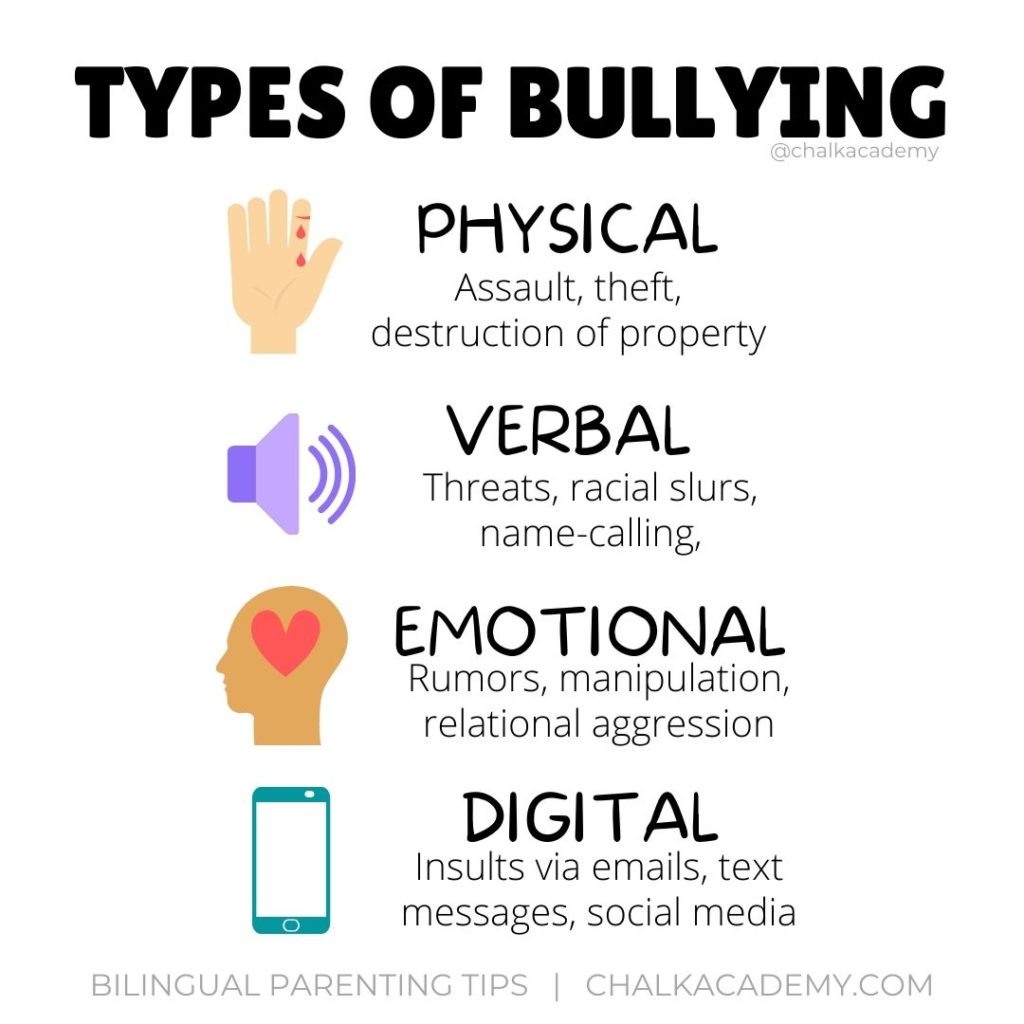
Types of bullying
Bullying is a public health problem that can manifest in various ways:
- Physical: assault, theft, destruction of personal possessions
- Verbal: threats, name-calling, racial slurs
- Emotional: rumors, manipulation, gaslighting
- Digital: emails, text messages, social media
Physical bullying is the easiest to identify, while other types can be insidious and difficult for adults to monitor.
My personal experience with racism and bullying
Growing up as one of few Asians in our school district, I experienced everything from slant-eye gestures to mocking of my immigrant parents’ accents.
However, microaggressions have been the worst, especially from people without insight into their actions. Microaggressions can be subtle, not obvious to others, and often exacerbated by gaslighting.
Like many of you, I became embarrassed about being a minority and avoided speaking Chinese. I skipped classes and gave every excuse to avoid school.
Related: A Letter to My Parents: Why I’m Teaching Your Grandchildren Chinese
In high school, a group of girls I had never met decided to target me. They spread stories about “an Asian b*tch”, and as rumors go, they claimed I had said and done things that never happened. I was harassed and assaulted.
I’m lucky that I survived these situations emotionally and physically. Eventually, I was able to rebuild my self-identity with confidence and integrity. I have healed after years of counseling, prayer, and spiritual guidance.

Consequences of bullying and racism
Unfortunately, too many bullied children are at risk for life-long mental health consequences.
With modern cyberbullying, victims may feel less able to escape from attacks. Misinformation can spread rapidly and widely; insults can become permanent public records and affect university and work opportunities.
Acute and chronic consequences include:
- Depression
- Anxiety
- Drug abuse
In severe cases, children may be at risk of suicide and life-threatening attacks. They may also reciprocate the aggression.
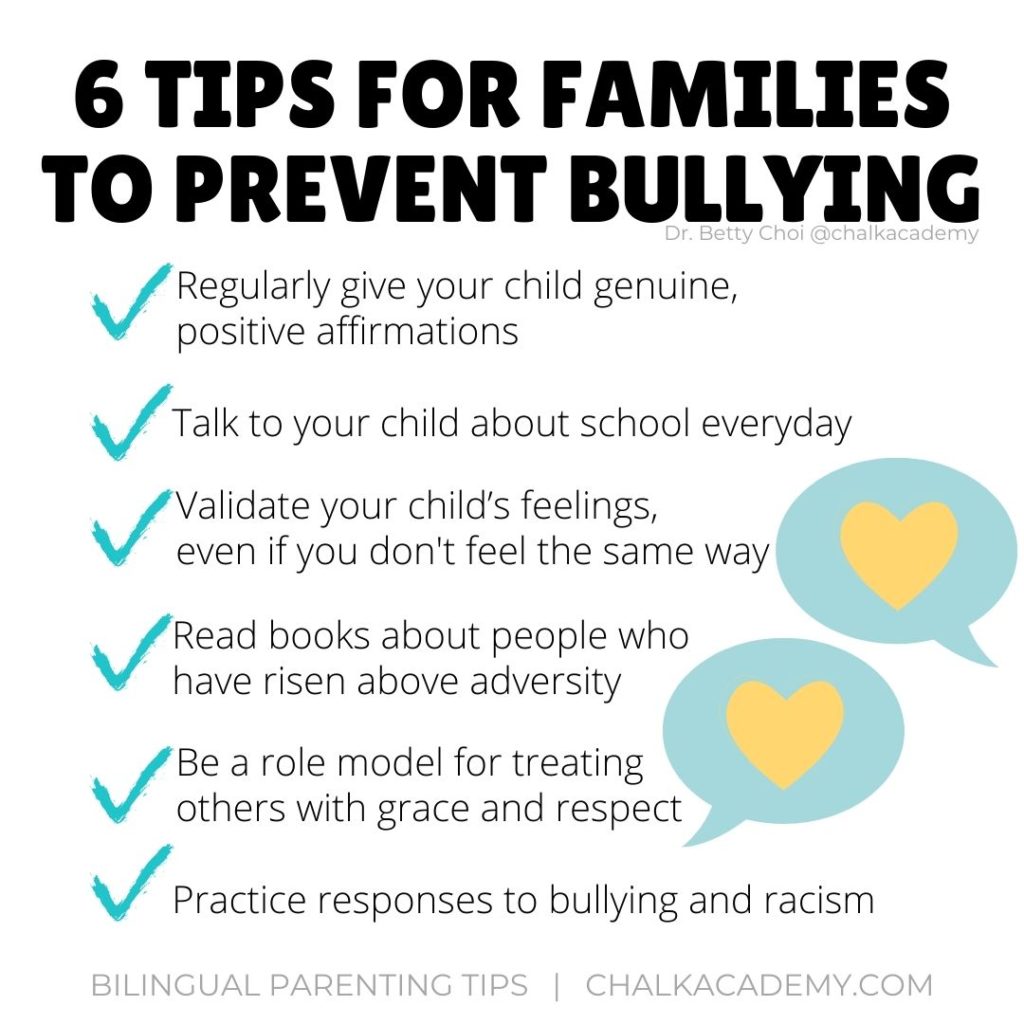
6 tips for multicultural and multilingual families to prevent bullying
Anti-racism and bullying prevention begins at home.
Provide positive affirmations to your child
Although compliments are not the norm in many Asian cultures, such as Chinese and Korean, children need to hear that they are smart, worthy, important, and beautiful.
This is because overt and subtle messages from the media and community can fill impressionable children with doubt and low self-esteem.
Genuine positive affirmations at home can help children establish a strong sense of self. When they feel supported at home, they are better equipped to counter negative falsehoods at school or elsewhere.
Explore this: Positive Affirmations Kids Need to Hear
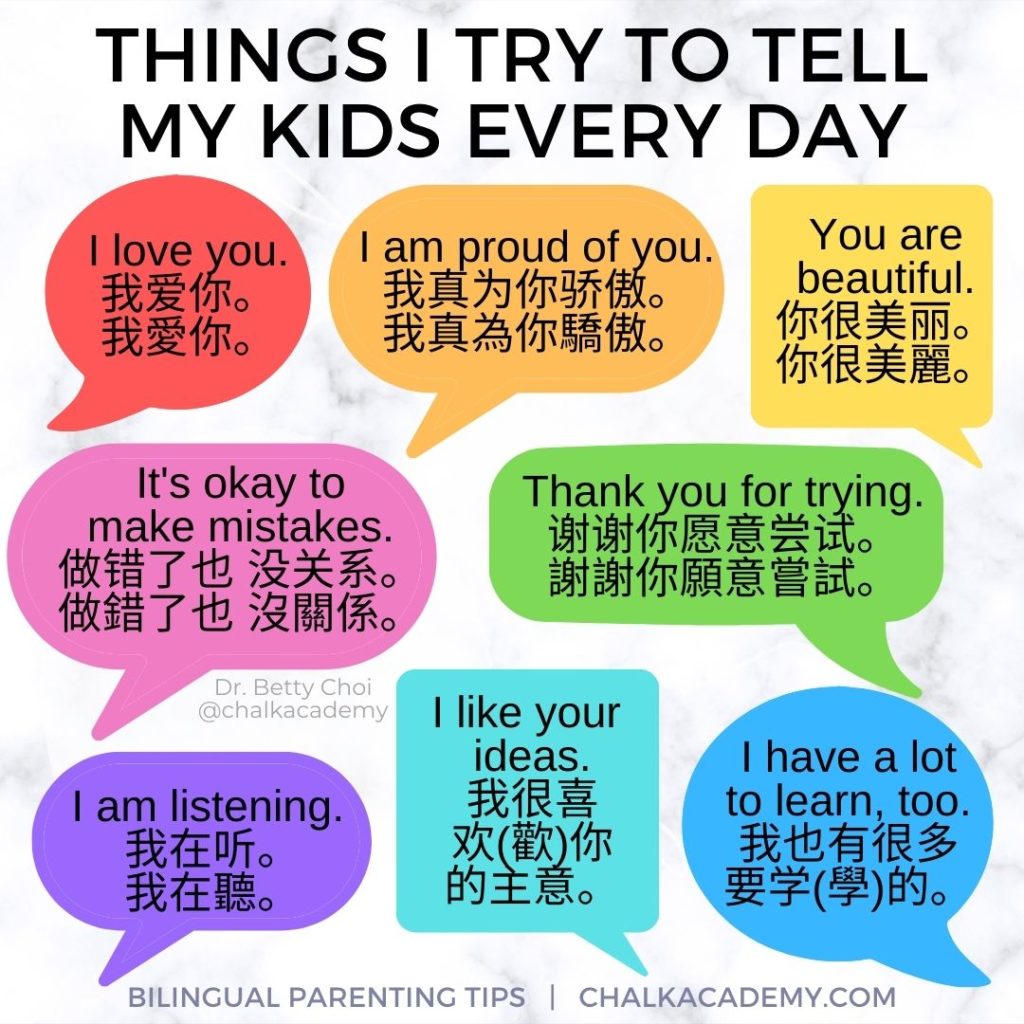
Talk to your child about school
Make a habit of talking about your child’s friends, classmates, and teachers everyday. Kids who are comfortable with their parents are more likely to open up about vulnerable experiences like bullying and racism.
What if kids give one-word answers and don’t know what to say? First, talk about your day so you can demonstrate how to share. Also, you can ask specific questions, like:
- “Who did you sit next to at lunch?” “你午饭時坐在誰的旁边?” / “你午飯時坐在誰的旁邊?” (Nǐ wǔfàn shí zuò zài shuí de pángbiān?)
- “What was the best part of your day? “一天中最美好的时光是什么? / 一天中最美好的時光是什麼?” (“Yītiān zhōng zuì měihǎo de shíguāng shì shénme?”)
- “What was the hardest part of your day?” “一天中最困难的時光是什么? / 一天中最困難的時光是什麼?” (Yītiān zhōng zuì kùnnán de shíguāng shì shénme)
- “How do you pronounce your friend’s name?” “你朋友的名字怎么发音? / 你朋友的名字怎麼發音?” (Nǐ péngyǒu de míngzì zěnme fāyīn)
- “How did you feel when______?” “_____ 時你感觉如何 / 時你感覺如何?” (Shí nǐ gǎnjué rúhé)
- “What is another way that you could have responded to this situation?” “你可能会对这种情况做出反应的另一种方式是什么? / 你可能會對這種情況做出反應的另一種方式是什麼?” (Nǐ kěnéng qiánzài de zhè zhǒng qíngkuàng zuò chū fǎnyìng de lìng yī zhǒng fāngshì shì shénme?)
These discussions establish rapport with your child and help caregivers have insight to school experiences.

Related: Emotions Book and Montessori 3-part cards in English, Chinese, and Korean
Validate your child’s feelings
When your child is sad, frustrated, or angry, acknowledge each emotion, even if you do not feel the same way. Help your child identify and name these feelings in all the languages you speak at home.
If a child’s concerns are often dismissed as unimportant, the turmoil that comes with bullying may be internalized and repressed.
Children who are bilingual or multilingual may not want to speak the minority language to fit in with peers. They have the right to choose what to say. Meanwhile, you can still consistently speak the language and create positive opportunities, such as cooking or other extracurricular activities in Chinese.

Read books about bullying
- 隐形男孩 / 隱形男孩 / Invisible Boy / 보이지 않는 아이 by Trudy Ludwig
- Traditional Chinese with Zhuyin / ISBN: 9789578640931: Books.com.tw
- Simplified Chinese / ISBN: 9787556201471: China Sprout
- English / ISBN: 9781582464503: Amazon
- Korean / ISBN: 9788994077642: Aladin
- Narration in Mandarin Chinese:
- Free on YouTube (reading followed by mother and child discussion)
- Compatible with Luka Reading Robot
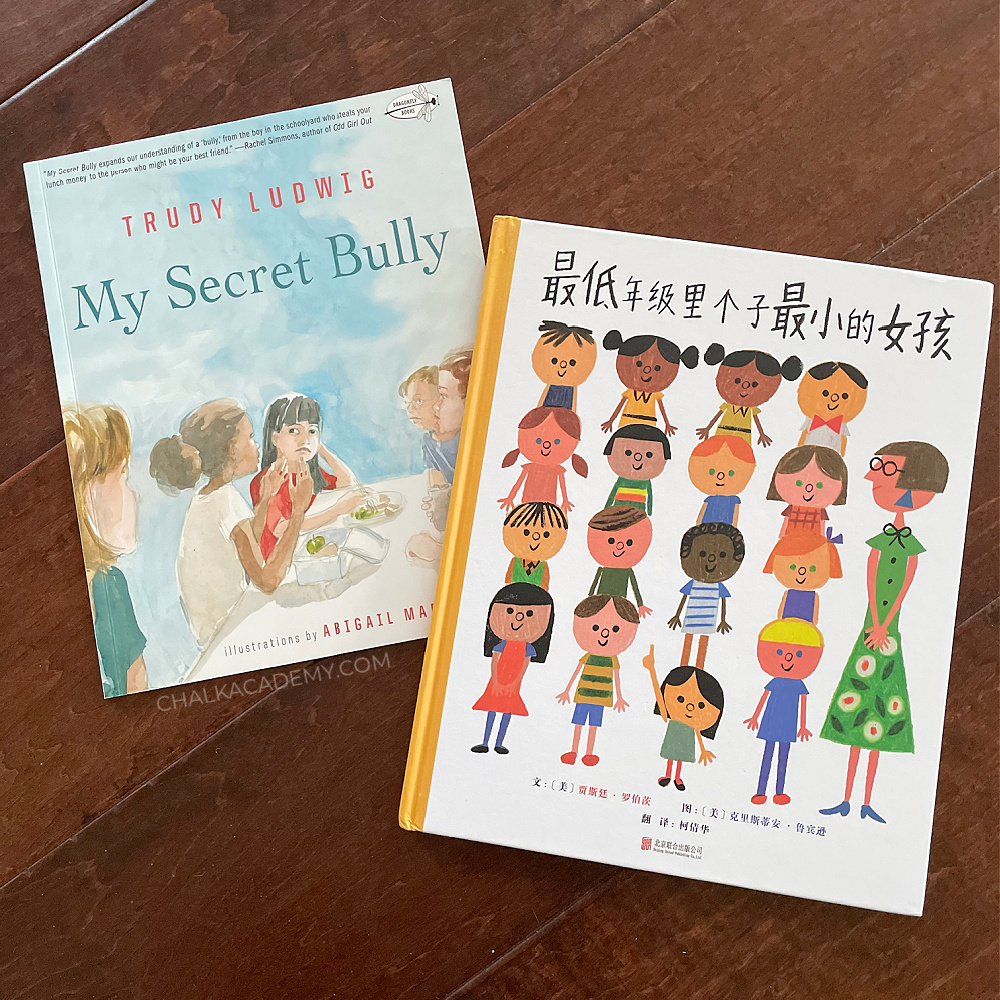
- 最低年级里个子最小的女孩 / 年紀最小的班級裡,個子最小的女孩 / The Smallest Girl in the Smallest Grade by Justin Roberts
- Simplified Chinese / ISBN: 9787550291034: TaoBao
- Traditional Chinese/ ISBN: 9789864400836: Books.com.tw
- English / ISBN: 9780399257438: Amazon
- Mandarin Narration:
- My Secret Bully by Trudy Ludwig
- English / ISBN: 9780553509403
Be an example of anti-bullying and anti-racism for your child
Do to others whatever you would like them to do to you.
Matthew 7:12 NLT
Children mirror what they see and hear.
How do you respond when you are upset with an aggressive telemarketer or a driver who is tailgating your car?
Do you shout expletives, or do you remain calm?
How do you discuss people that bother you? How do you personally handle insults and disrespect from others?
On the other hand, do you have friends who speak other languages and look different than your family?
If you are bilingual, can you confidently speak the minority language in public?
Practice responses to bullying and racism
Be clear about what consists of helpful versus harmful behavior. Bullying, being bullied, and watching other kids get bullied is never okay.
Talk through example scenarios and how to respond. What situations should be confronted directly? When should you walk away and ask for help?
Advice for schools to prevent racism and bullying
Bullying and racism are public health issues that require anti-bias education and bullying prevention training across schools. Teachers and principals need to be allies to children, but unfortunately, they are sometimes complicit deliberately or unconsciously.
(Edit October 25, 2020) After writing this post, I came across the Asian American Psychological Association Bullying Awareness Campaign. I haven’t looked at the 20-page guide in detail yet, but it appears to be quite comprehensive, with scenarios for spouses, caregivers, teachers, and school administration to brainstorm. Translations in simplified Chinese, traditional Chinese, Korean, and Vietnamese are available!
Colorín Colorado has a detailed article with 8 Tips to Protect English Language Learners from Bullying in Your Classroom and School.
Please see the websites below for additional resources.
Helpful anti-bullying and anti-racism websites
- Stopbullying.gov: This website lists training resources, media guidelines, research, and more.
- Common Sense Education: This reputable nonprofit organization in the US is dedicated to educating and advocating for safe technology and media for children.
- National Suicide Prevention Lifeline: 1-800-273-TALK (8255) This toll-free number offers 24-hour crisis counseling and mental health referrals.
- Asians for Mental Health: Dr. Jenny Wang, PhD is a psychologist who is dedicated to common issues pertaining to the Asian diaspora. Her Instagram account features thoughtful reflections, while her website has a directory of Asian mental health providers.
- Asian Americans Advancing Justice
- Be The Bridge: This Christian organization is dedicated to racial justice and reconciliation.
Faith-based articles about bullying
- How to Teach Children to Deal with Bullying(Gospel Coalition)
- When They Hurt You with Words (Desiring God)
- Lay Aside the Weight of Slander (Desiring God)
- Haters Gon’ Hate (Desiring God)
- Jesus Taught the Solution to Bullying (Psychology Today)
Have you talked to your children about preventing bullying and racism?
Parents and teachers, can you share your experiences with these discussions? Please feel free to comment below with your story and any suggestions you may have.
Together, we can prevent bullying and empower our children to speak out against injustices.
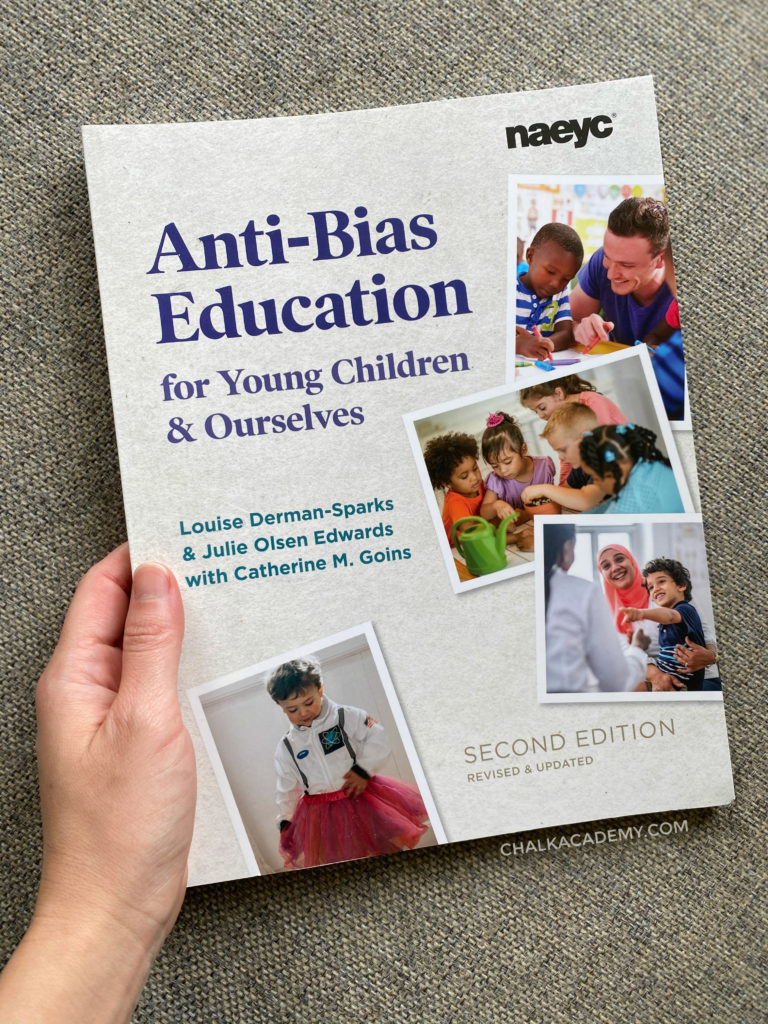
Something is going on at my daughter’s classroom, I don’t know if her teacher and principal are taking this for real!? I just want to help my daughter feel safe, to have fun, enjoy school and not worried about what some girls keep telling her, I wish all this could stop. They are on 3rd grade, my daughter besides been Hispanic, she es Petit, has food allergies and has a special really healthy diet. So she has been criticized for all of that. I’m praying for her to be surrounded by nice classmates and good friends, who can accept her as how she is. She’s only 9 has cried a lot due to all of this. I looking to help and suggest her teacher some books and activities for the whole class. Thank you for this space